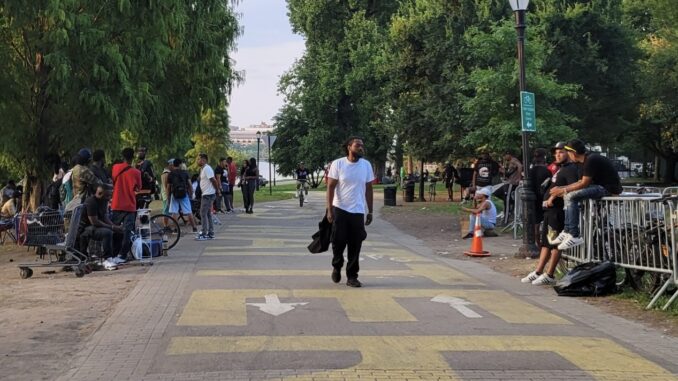
BY: SAMANTHA LORISTON
This Election Day, federal policies weighed heavily on the minds of many undocumented immigrants, who face constant uncertainty in their lives. Interviews with immigrants and their advocates found many struggling with fears of deportation and family separation.
Judith Dolcé, assistant director at the Haitian Studies Institute, expressed deep concern for family members living. “Pathways to legalization would make a huge difference in their lives,” she says, emphasizing how limited options for citizenship or legal status restrict access to employment and education. For Dolcé and many like her, immigration policy isn’t just an abstract issue; it affects their families’ survival.
This year, Dolcé feels especially anxious because of rising anti-Haitian rhetoric in political discourse. “Before, it was mostly about deportation. Now it’s about our safety,” she explained. She noted that Haitians have been labeled “cat eaters” and portrayed as threats to communities, a dangerous narrative that goes beyond immigration policy and touches daily life. “We feel trapped, caught between anti-Haitian sentiment here and the instability back in Haiti,” Dolcé said, her voice conveying despair.
A New York City college senior, who asked not to be identified by name, echoed Dolcé’s concerns. “The fear of deportation and family separation affects my view of this election,” she said. Pathways to citizenship are often difficult and uncertain. “Even programs meant to help immigrants gain residency don’t guarantee anything,” she explained, adding that she worries about losing job security and basic rights. “It’s disheartening to be an immigrant in America,” she said. “But we are resilient.”
Aharon Grama, an administrative coordinator at Brooklyn College, saw this election as crucial for immigrant communities. “I support immigration, but it must be legal, and the current system is overwhelmed,” he stated, advocating for more resources to process asylum cases. Grama, who is not an immigrant himself, empathized with the community’s resilience while acknowledging frustrations with resource limitations and instability. “The stakes are real,” he noted, referencing the strain on New York City, a sanctuary city that receives limited federal support. “The Democratic loss reflects the public’s frustration with policies that haven’t effectively addressed community needs.”
For a Nigerian student at Brooklyn College who identifies as an immigrant, the stakes feel particularly high. “If pathways to citizenship or green cards were removed or challenged, that would change everything for my family and me,” the student explained. Deportation feels unimaginable after building a life here. “I have so much here,” the student added, worrying that continued anti-immigrant rhetoric could fuel more misunderstanding of immigrant contributions.
Each person hoped voters would recognize the humanity and complexity in the immigrant experience, remembering the dreams that have brought earlier and current immigrants to America. As Dolcé reflected, “Immigrants built this country, contributing greatly to its progress. America wouldn’t be what it is without immigrants.”
